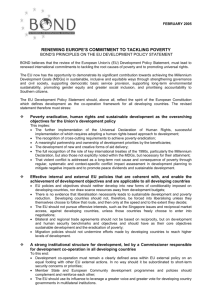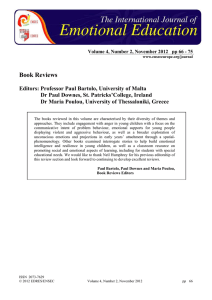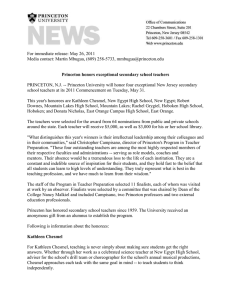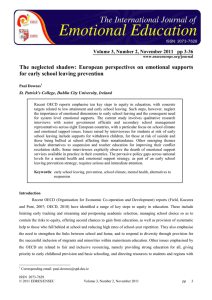Editorial Volume 3, Number 2, November 2011 pp 1-2
advertisement
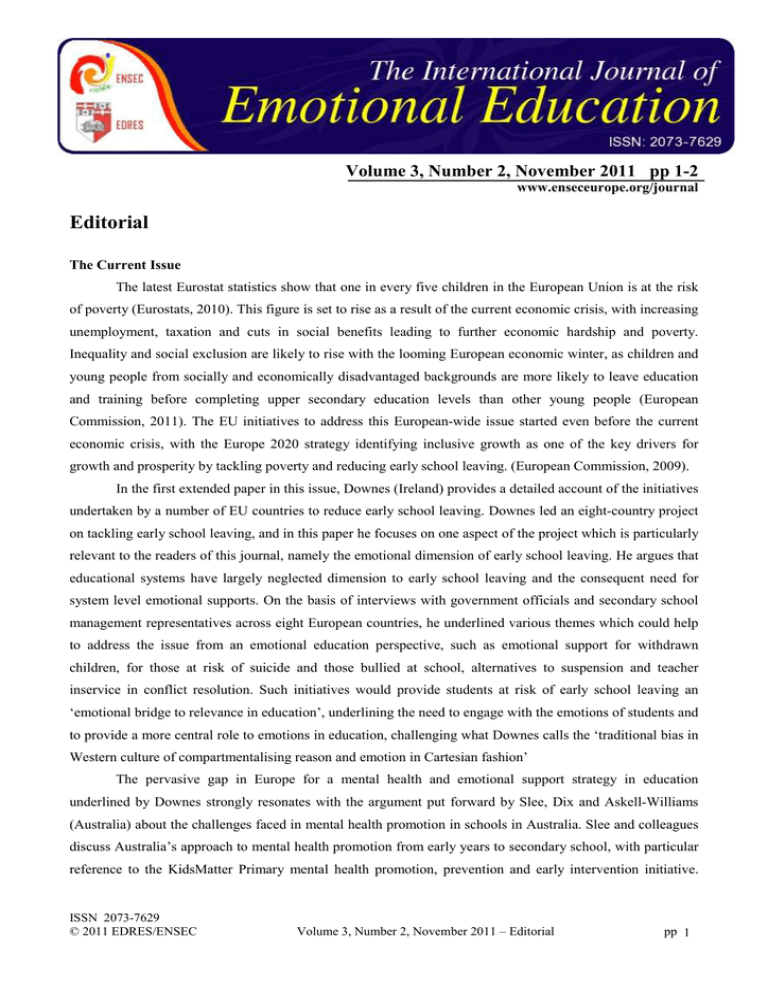
Volume 3, Number 2, November 2011 pp 1-2 www.enseceurope.org/journal Editorial The Current Issue The latest Eurostat statistics show that one in every five children in the European Union is at the risk of poverty (Eurostats, 2010). This figure is set to rise as a result of the current economic crisis, with increasing unemployment, taxation and cuts in social benefits leading to further economic hardship and poverty. Inequality and social exclusion are likely to rise with the looming European economic winter, as children and young people from socially and economically disadvantaged backgrounds are more likely to leave education and training before completing upper secondary education levels than other young people (European Commission, 2011). The EU initiatives to address this European-wide issue started even before the current economic crisis, with the Europe 2020 strategy identifying inclusive growth as one of the key drivers for growth and prosperity by tackling poverty and reducing early school leaving. (European Commission, 2009). In the first extended paper in this issue, Downes (Ireland) provides a detailed account of the initiatives undertaken by a number of EU countries to reduce early school leaving. Downes led an eight-country project on tackling early school leaving, and in this paper he focuses on one aspect of the project which is particularly relevant to the readers of this journal, namely the emotional dimension of early school leaving. He argues that educational systems have largely neglected dimension to early school leaving and the consequent need for system level emotional supports. On the basis of interviews with government officials and secondary school management representatives across eight European countries, he underlined various themes which could help to address the issue from an emotional education perspective, such as emotional support for withdrawn children, for those at risk of suicide and those bullied at school, alternatives to suspension and teacher inservice in conflict resolution. Such initiatives would provide students at risk of early school leaving an ‘emotional bridge to relevance in education’, underlining the need to engage with the emotions of students and to provide a more central role to emotions in education, challenging what Downes calls the ‘traditional bias in Western culture of compartmentalising reason and emotion in Cartesian fashion’ The pervasive gap in Europe for a mental health and emotional support strategy in education underlined by Downes strongly resonates with the argument put forward by Slee, Dix and Askell-Williams (Australia) about the challenges faced in mental health promotion in schools in Australia. Slee and colleagues discuss Australia’s approach to mental health promotion from early years to secondary school, with particular reference to the KidsMatter Primary mental health promotion, prevention and early intervention initiative. ISSN 2073-7629 © 2011 EDRES/ENSEC Volume 3, Number 2, November 2011 – Editorial pp 1 They underline the key role of schools for the promotion of mental health, arguing that teachers can effectively deliver mental health programs in the context of the school curriculum. While Kids Matter has been evaluated and found to have positive impacts upon student mental health, the authors report that significant challenges still exist in the effective implementation and maintenance of the delivery of evidencebased practice in school settings, with particular concerns about quality assurance in processes of implementation, translation, dissemination and evaluation. In the third paper, Cowie (UK) focuses on one particular aspect of mental health in schools, namely coping with the emotional impact of bullying and cyberbullying. Cowie discusses the implications of cyberbullying, arguing that though virtual, this is also a form of interpersonal problem and presents interpersonal safety issues. She explores the strategies that are commonly recommended for e-safety, arguing that rather than dealing with the issue as something new, we should make more use of, and build on, existing knowledge on preventing and reducing traditional face-to-face bullying. References: European Commission (2009) Strategic Objective of the EU Council's 'Strategic Framework for European cooperation in Education and Training for 2020. Brussels: European Commission. European Commission (2011) Tackling early school leaving: A key contribution to the Europe 2020 Agenda. Brussels: European Commission. Eurostat (2010) Combating poverty and social exclusion. A statistical portrait of the European Union 2010. Last retrieved on 1st November 2011 from: epp.eurostat.ec.europa.eu/cache/ITY_OFFPUB/KS-EP-09-001/EN/KS-EP- Paul Cooper & Carmel Cefai pwc5@le.ac.uk, carmel.cefai@um.edu.mt ISSN 2073-7629 © 2011 EDRES/ENSEC Volume 3, Number 2, November 2011 – Editorial pp 2

